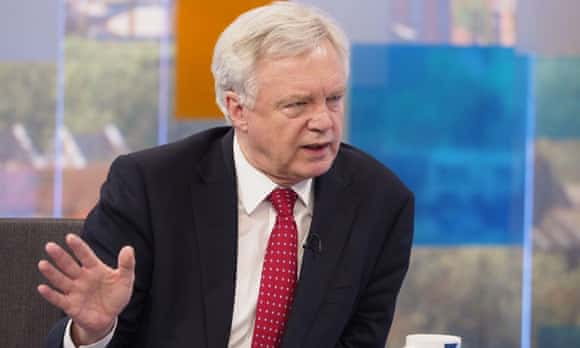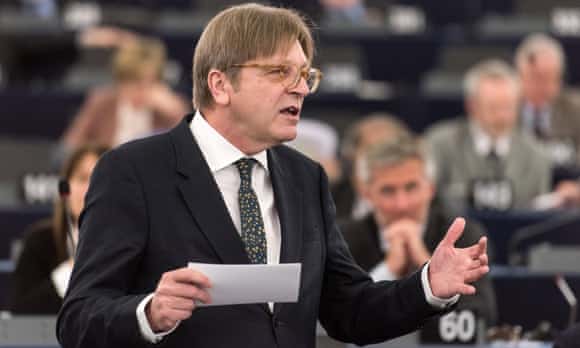 | Brexit weekly briefing: Tory election bombast means reality must wait | UK ministers' fighting talk may not go down well with the EU – but appears to be helping the Conservatives' poll ratings |  |  David Davis on the Peston on Sunday show. The Brexit secretary has predicted negotiations will be the 'row of the summer'. Photograph: Ken McKay/ITV/REX/Shutterstock
| Jon Henley and Peter Walker
| Welcome to the Guardian's weekly Brexit briefing, a summary of developments as the UK gallops towards the EU door marked "exit". If you'd like to receive it as a weekly early morning email, please sign up here. You can listen to our latest Brexit Means … podcast, updated every Wednesday, here. And with the general election under way in the UK, you can also sign up to the Snap, our daily email election briefing, here.
Also: producing the Guardian's independent, in-depth journalism takes a lot of time and money. We do it because we believe our perspective matters – and it may well be your perspective too. If you value our Brexit coverage, become a Guardian Supporter and help make our future more secure. Thank you. The big picture Anybody would think there was an election on. At least, maybe that's why British ministers seem so intent on pushing out the same Brexit lines even though the EU has repeatedly said they're not realistic. | | More: 'Goodwill on both sides' to resolve Irish border issue, says Theresa May | Take the border between Northern Ireland and the Irish Republic, which post-Brexit will become a land border with the EU. The bloc's chief negotiator, Michel Barnier, was there last week warning there would be consequences for customs controls: We have the duty to speak the truth. Customs controls are part of EU management – they protect the single market, they protect our food safety and our standards … But nothing should put peace at risk. Now the EU has insisted all along that progress will have to be made on the question of the border, along with the size of Britain's divorce bill and citizens' rights, before there can be any discussion about the future relationship. But the Brexit secretary, David Davis, said the EU's programme was "wholly illogical and wrong", predicting "the row of the summer" as the UK would insist none of the above could be addressed until the future relationship was clear. Davis also predicted a row over whether or not the European court of justice could or should be the arbiter of EU citizens' rights in the UK after Brexit – and, indeed, over what precisely those rights should be. The foreign secretary, Boris Johnson, meanwhile, told the Telegraph the EU could end up paying a Brexit bill to Britain rather than the other way round, warning that Brussels would "play dirty" and "try to bleed this country white". The huffing and puffing, at any rate, seems to be working: polls show Theresa May's Conservatives maintaining an 18- to 20-point lead over Labour. The view from Europe France's new president, Emmanuel Macron, flew to Berlin on Monday to meet Angela Merkel. Even if his more ambitious eurozone plans go nowhere, the EU's crucial Franco-German motor is looking in good shape. Following a highly convincing win for Merkel's CDU in regional elections in North Rhine-Westphalia over the weekend, the German chancellor now seems almost certain to be returned for a fourth term in the autumn. All this will matter to the upcoming Brexit talks not because the EU will up its demands, but because it is likely to pursue those it has already formulated with greater determination and confidence. As, one presumes, will May.
Meanwhile Guy Verhofstadt, the European parliament's Brexit coordinator, said MEPs would veto any Brexit deal that failed to uphold the rights of the 3.5 million EU nationals in the UK and 1.2 million Britons in Europe. The parliament, which has the right of veto over any Brexit deal, will ensure it exerts "the necessary pressure" to bear, Verhofstadt said: We will never give consent if the issues of citizens' rights, on both sides, has not been dealt with in a satisfactory way. |  |  Guy Verhofstadt is determined to protect the rights of EU nationals in the UK and Britons in Europe. Photograph: Patrick Seeger/EPA
| Meanwhile, back in Westminster For Westminster, again this week see instead everywhere from a factory in Mansfield to a pensioners' centre in Norwich. Yes, it's full campaign time, and the party leaders are on the road, some even on battlebuses, amid yet more talk of "strong and stable leadership" or "the many, not the few". Despite Brexit being the defining political debate of the era, there has been remarkably little talk so far in the election campaign about how it might actually happen, with significantly more focus on areas such as the NHS and spending. There might be more clues in the coming week, as from Tuesday to Thursday, Labour, the Lib Dems and Labour release their full manifestos. In the case of Labour it is arguably more of a rerelease, given the way several versions of the draft manifesto were leaked before the document was even finalised by the party's shadow cabinet and national executive. Perhaps the most significant news for the election, Brexit-wise, came on Friday, with the revelation that Ukip are standing in just 377 of the UK's 650 seats, down from 624 at the last election. This could see yet more of the almost 4m votes gathered by Ukip in 2015 shift to the Conservatives, granting May an even bigger parliamentary majority than forecast – and more power to shape Brexit as she sees fit. You should also know ... Read these: In The Guardian, Zoe Williams says remoaners should not be rejoicing in Brexit failings because that's a distraction from building strong post-EU alliances: Obvious negative consequences of Brexit fill me with grim delight. I track them like a new hobby: national-catastrophe-bird-watching ... This has to stop. It may be the Brexiters who shot us in the foot, but we're all the same body politic and we'll all feel the same pain. We cannot rejoice in their chaos and failure at the same time as building constructive, post-EU, pan-European alliances. Sometimes, to think critically and creatively about a problem, you need to forget which side you're on. In the New Statesman, Jeremy Cliffe says where German pragmatism and prosperity once made a closer relationship with London a priority, they now demand single market cohesion: Brexit must be clean, and the British – the Inselaffen, or island monkeys – must pay: There is a new consensus abroad in Germany: that the country's destiny lies with France and other continental powers, that its European vocation needs defending, and that the wheeling-dealing British have lost their pragmatic mojo. And, just perhaps, that the Inselaffen were less rational than Germans thought all along. Tweet of the week David Allen Green with a sobering reminder ... | | | | Guardian News & Media Limited - a member of Guardian Media Group PLC. Registered Office: Kings Place, 90 York Way, London, N1 9GU. Registered in England No. 908396 |
| | | |
No comments:
Post a Comment